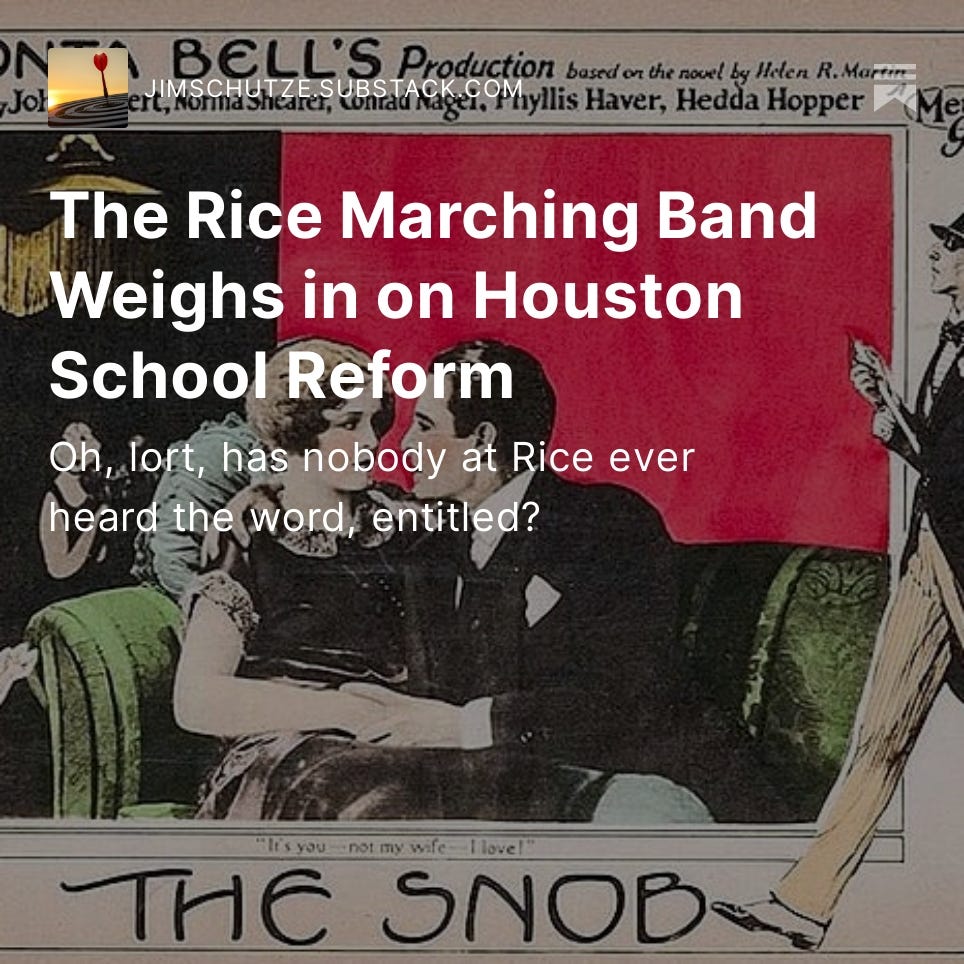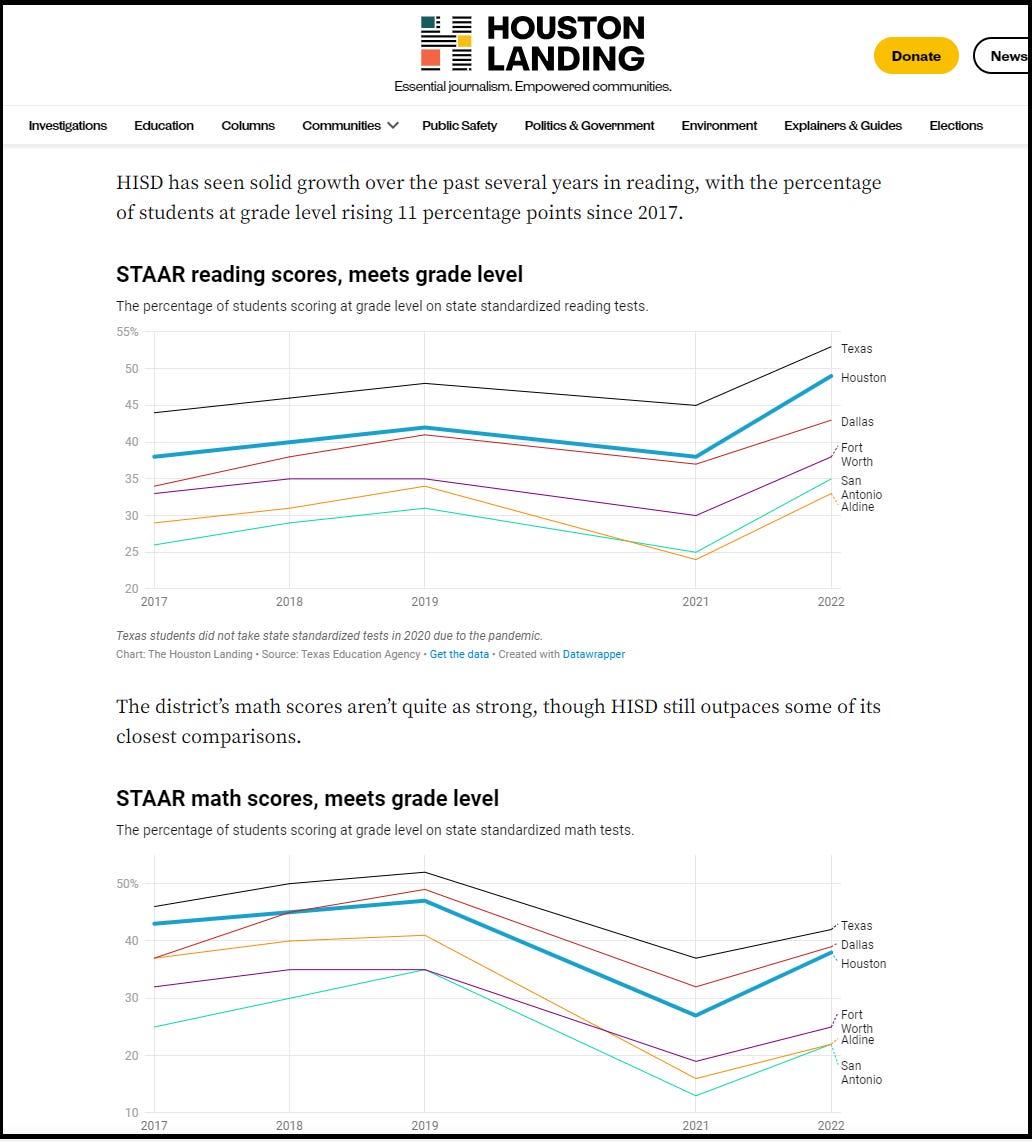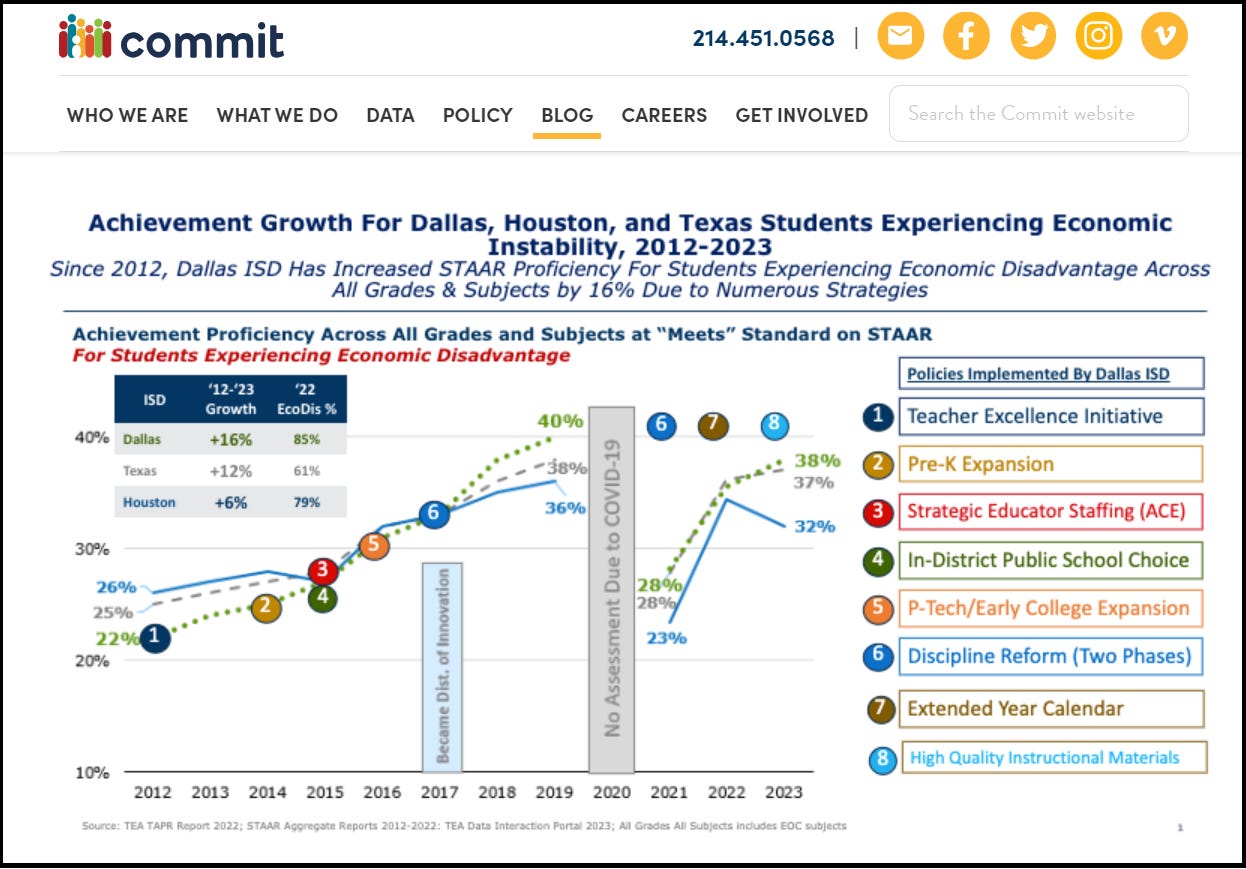On the next English exam at Rice University: who can spell entitled?
These kids may be smart, but they use a little class.
From a distance – an admitted substantial distance, because I’m in Dallas, not Houston -- the thing that strikes me most in some of the more strident opposition to the Mike Miles reform regime underway now in the Houston public school system is the incredible smugness.
Smug, based on what?
Nobody ever said non-poor kids, middle class kids or rich kids weren’t doing well in the Houston public schools. In fact, Houston has always been a leader in Texas, not merely for doing a good job of teaching privileged kids but also keeping them in the public school system in the first place.
The percentage of poor kids in the Houston public school system is substantially lower than the percentage in the Dallas school system. That should be read at least in part as success in keeping the non-poor families on the farm.
That’s a good thing. But that obviously is not why the city just had its entire school board and superintendent defenestrated by the state and an unelected board imposed in their place.
It’s the poor kids, stupid. You can’t ditch them. It’s the law. And the specific law that got Houston defenestrated was written by a black Houston legislator, specifically because Houston had been ditching its poor kids for a decade.
How hard is that to get? Is there something complicated? Must be.
The Rice marching band recently put on what they obviously thought was a hilarious half-time show spoofing the Mike Miles reform effort underway in the public schools. When I looked at the story about it in The Houston Chronicle, I thought, you horrible little snots.
Yeah, sure, you’re all at Rice. You already have it made. You’re in tall cotton. But do you not have a single drop of compassion for the kids you left behind?
I wonder if a single one of those strutting brats has ever even heard the phrase, kindergarten to prison pipeline, if any of them understands what lies ahead for the 68 percent of Houston third-graders who did not achieve fluent literacy under the pre-Miles regime?
Houston keeps telling itself its schools are doing really well already, apparently believing the crowd-control line from the teachers union. Nothing going on here, folks, no need to change anything, please return to your homes.
Houston Landing this week published a comparison of student performance in Houston with other major Texas cities and with statewide scores on state achievement tests. And, yes, Houston looks good in the measurements Houston Landing chose to examine. But those are the citywide scores that get carried across the finish line by the non-poor kids.
Nobody ever said Houston wasn’t doing a great job with the non-poor kids. That’s not the issue.
The Commit Partnership, an education advocacy and research foundation headquartered in Dallas, publishes some of the best tracking numbers on student achievement in Texas by demographic category. This week on their blog, kind of buried in a longer article about school reform, I spied a graphic that goes directly to the point I’m trying to make here.
Rather than look only at demographically undifferentiated numbers, this graphic compares how Houston and Dallas have done with poor kids over the last decade.
Even though poverty is substantially more concentrated in Dallas schools than in Houston – 85 percent economically disadvantaged versus 79 – achievement by poor students in Dallas since 2012 has improved at 2.6 times the rate for poor kids in Houston.
From far below the statewide numbers in 2012 – and even farther below Houston – Dallas’s achievement numbers for poor kids in all grades and all subjects has risen just above the statewide numbers and is now quite a bit above Houston.
The Commit graphic depicts the points in time when specific reforms were put in place and their correlation with improvements in achievement. Tell me that correlation is not causation – I know that.
But you can’t make me not notice that some of Dallas’ best boosts in achievement are correlated with a reform of the discipline policy and the adoption of a very intentional racial equity policy and creation of an office of racial equity.
If nothing else, Dallas was thinking about equity. A lot. It didn’t seem to do harm. And I don’t remember any marching bands making fun of it.
I spoke a few days ago with a person who was high up in the Miles regime when Miles was here in Dallas a decade ago. He said one great irony for him is that, back when Dallas was working hardest at reform, its model and goal to shoot for was Houston.
“Houston was the gold standard ten years ago,” he said.
What has happened since, he said, is that Dallas has pulled up its trajectory substantially by improving teaching for poor kids, while Houston, patting itself on the back for teaching privileged kids, has gone flat to negative.
I do wonder why this stuff is so hard for some people to get. And I do keep thinking about those kids in the Rice band. The best information I can dig up online is that an undergraduate degree at Rice costs somebody about $288,000.
The Rice University Kinder Institute is very helpful for giving me a picture of life in Houston at the other end of the scale. Kinder’s numbers show that in the city’s poorest neighborhood, Sunnyside, which is 79.4 percent black, median annual income is $27,500.
So – check my math – the price for a degree from Rice is equivalent to 10.5 years of personal income in Sunnyside. And, look, I know a lot of those kids get substantial scholarship help, and anyway I’m thrilled they’re at Rice, no matter who’s paying for it. What a great school.
I just wish the ones in the marching band could have a little class about it.








Asking Rice’s MOB band for class is like asking Saturday Night Live for nuanced and considered debate. They’re intentionally provocative and loving all the attention they’re getting, regardless of how accurate or graceful their satire is.
Looking at the Commit chart, none of this is anything to be proud of in terms of how Texas ensures a quality education for economically disadvantaged students. It will be interesting to see if Dallas can maintain its upward trend and whether Houston can pick up the pace.